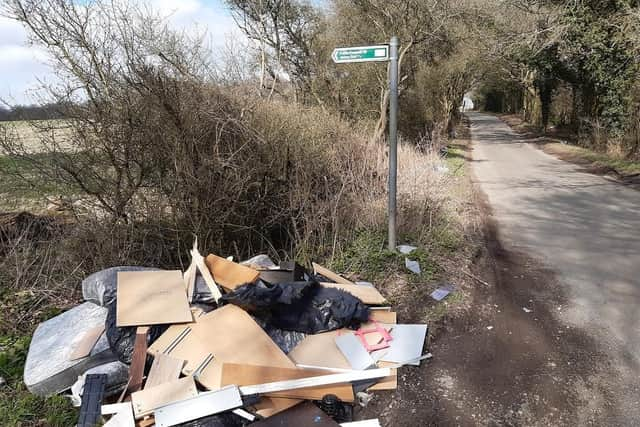Fly-tipping prevention advice from the Countryside Alliance after Hemel woman prosecuted over dumped waste
and live on Freeview channel 276
The Countryside Alliance has offered its fly-tipping prevention guide to residents after a woman from Hemel Hempstead was fined after her household rubbish was dumped.
And it also reiterated its call for tougher action and greater public awareness of the crime.
Advertisement
Hide AdAdvertisement
Hide AdOn Wednesday, September 29, Dacorum Borough Council, successfully prosecuted Kirsty Jenkins for a fly-tipping offence that occurred on or before 23 March 2021 in Puddephats Lane, Flamstead.


She was issued with a £300 Fixed Penalty Notice by the council for failing to demonstrate her duty of care responsibilities when disposing of the waste - but this was not paid.
Ms Jenkins stated that she had paid someone else to dispose of the waste but had not intended for this to be disposed of unlawfully and did not want to name and involve the individual who had taken the waste.
As part of the Countryside Alliance’s ongoing anti- fly-tipping campaign, the group is pushing for improved access to Civic Amenity sites: extension of opening hours; locations; and overhaul and standardisation of admission policies, to encourage lawful disposal of waste.
Advertisement
Hide AdAdvertisement
Hide AdThe organisation believes there needs to be greater support for landowners: anti-fly-tipping measures; utilisation of comprehension orders; and closer working relationships with local authorities in recognition of the particular problems caused by waste fly-tipped on private land.
The group is also highlighting the importance of understanding the legalities around paying for refuse to be taken away.
The group claims many people are either knowingly or out of confusion funding un-licensed fake refuse collectors to take rubbish away, only for it to end up dumped in the countryside.
Sarah Lee, director of policy and campaigns of the Countryside Alliance said: “The images of fly-tipping, though horrendous, are an all too familiar sight. To make serious headway, we need to understand the business of illegal waste disposal and the culture that abets it.
Advertisement
Hide AdAdvertisement
Hide Ad"Fly-tipping, as most know it, has developed over the years. It represents much more than just chucking an unwanted Christmas tree, or a bag of rubbish out of a moving car at the dead of night. It has become a business and people up and down the country are, either knowingly or out of confusion, aiding it.
"If you’re paying under £140 for someone to dispose of your waste, then it’s more than likely going to end up in rural areas.
"We have struggled to find fully licensed waste disposal operations for under £150 and herein lies the problem.
"It’s unclear how many people realise that in order to legally hire a disposal service, it falls on you to establish whether the operator has the correct license.
Advertisement
Hide AdAdvertisement
Hide Ad"That means that when an attractive deal online pops up, you are required to ask for proof of the licence, rather than just taking the ad as verbatim.
"You can even search a company name on the Environment Agency website to ensure it has the correct license.
"By failing to carry out these basic checks, you risk fuelling criminality and blighting our picturesque landscapes.”
The National Fly-tipping prevention group, of which the Countryside Alliance is a member has the following advice to victims of fly-tipping:
Advertisement
Hide AdAdvertisement
Hide Ad> Be cautious. Some fly-tipped waste can be hazardous. Do not open bags or drums and be aware that piles of soil may be contaminated or hide dangerous material.
> Record as many details as possible about the waste and when you found it. If possible take a photograph of the waste.
> Report the incident – do not move the waste or remove any evidence from it until the authorities have been notified.
> Secure the waste so that it cannot be interfered with or added to.
Advertisement
Hide AdAdvertisement
Hide Ad> Remember that fly-tippers are doing something illegal – they are unlikely to welcome people observing them. Do not put yourself at risk – if fly-tipping is in progress, call 999.
> When arranging for disposal, ensure that you use a registered waste carrier, as if it is dumped elsewhere you could be held responsible and face an unlimited fine.
> Ensure that you get documentation which includes the details of the waste and who is taking it away.
> If you take the waste to a licensed waste site yourself, make sure you are registered as a waste carrier.
Advertisement
Hide AdAdvertisement
Hide Ad> If the waste is hazardous then make sure that it is being carried and disposed of by those licensed to deal with hazardous waste.
> Keep full details of your clearance and disposal costs. Successful prosecution can mean that your costs incurred for the removal of the waste can also be recovered.
